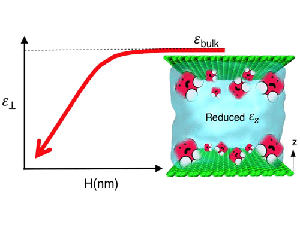Universal Reduction in Dielectric Response of Confined Fluids
 ACS Nano 2020, 14, 10, 12761–12770
ACS Nano 2020, 14, 10, 12761–12770
Mohammad H. Motevaselian and Narayana R. Aluru
The abstract reads as follows: Dielectric permittivity is central to many biological and physiochemical systems, as it affects the long-range electrostatic interactions. Similar to many fluid properties, confinement greatly alters the dielectric response of polar liquids. Many studies have focused on the reduction of the dielectric response of water under confinement. Here, using molecular dynamics simulations, statistical-mechanical theories, and multiscale methods, we study the out-of-plane (z-axis) dielectric response of protic and aprotic fluids confined inside slit-like graphene channels. We show that the reduction in perpendicular permittivity is universal for all the fluids and exhibits a Langevin-like behavior as a function of channel width. We show that this reduction is due to the favorable in-plane (x–y plane) dipole–dipole electrostatic interactions of the interfacial fluid layer. Furthermore, we observe an anomalously low dielectric response under an extreme confinement.
The work on the estimation of the perpendicular dielectric permittivity of water was supported by the Center for Enhanced Nanofluidic Transport (CENT), an Energy Frontier Research Center funded by the U.S. Department of Energy, Office of Science, Basic Energy Sciences (Award #DESC0019112).
https://pubs.acs.org/doi/10.1021/acsnano.0c03173
